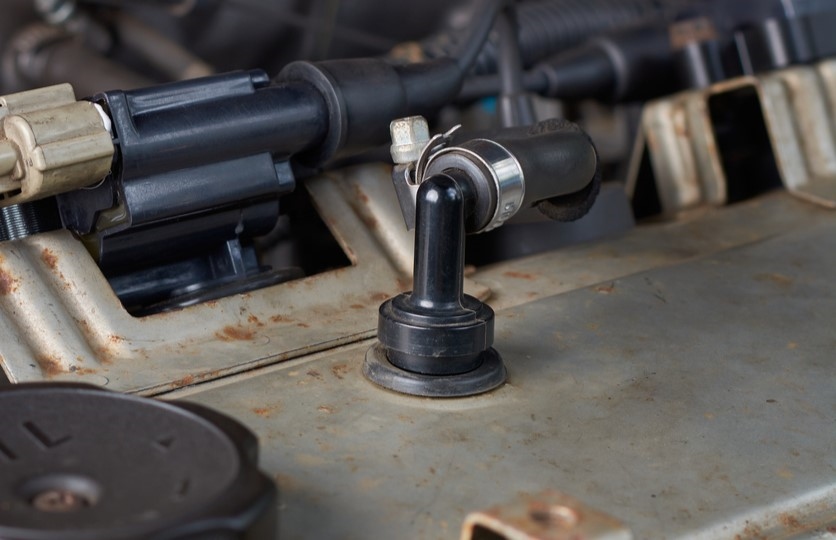It’s no secret that regular maintenance is an important part of keeping your vehicle in its best condition. While you make it a priority to stay on top of oil changes, what about the more forgotten parts that are essential to keeping your engine running? The professionals at Kennedy Transmission want to keep you tuned into everything under your vehicle’s hood, including the PCV valve. Keep reading for information about the role of the PCV valve and common questions about its maintenance.
What is a PCV Valve?
PCV stands for Positive Crankcase Ventilation, but what exactly does that mean? Your car’s PCV valve is a one-way valve attached to the crankcase that holds motor oil and produces gasses when your engine burns fuel.
How To Tell if a PCV Valve is Bad
Excess oil consumption is one of the most obvious signs that your PCV valve needs to be replaced. If the valve gets stuck in the open position, excess vapors will be drawn from the crankcase, which results in your car burning more oil than usual. In addition, oil-stained spark plugs and oil spots under your car are likely indicators that something isn’t right. The answer is yes if you’re wondering whether a PCV valve will cause an oil leak. So be sure to check under the hood if oil stains appear on your garage floor.
Not only can you identify problems with visual cues, but a disconnected or damaged PCV valve can cause your engine to make strange sounds. Whirring or whistling noises can be caused by air escaping from the valve or the valve’s hose hole. A variety of things can cause strange noises coming from under the hood, so it’s important not to let these go unchecked.
You can also remove the PCV valve from the valve cover with the attached hose and place your finger over the open end. If you feel a strong suction, the valve is working correctly. If the suction is weak or non-existent, an obstruction is present in the valve.
If you’ve discovered your PCV valve needs replacement, don’t worry. The fix is simple and can be completed by a professional or even by you at home!
How often should you replace your PCV valve?
There isn’t a specific lifespan for a PCV valve, but you can usually plan to replace it anywhere between 20,000 and 50,000 of driving. Like many other parts of your car, regular maintenance will extend the life of your PCV valve, while neglecting regular oil changes and signs of trouble will shorten it.
The PCV valve likely isn’t high on your list of maintenance items but a bad valve can lead to other problems including performance and emission problems. If the issues are caused by a valve that is just dirty, there’s an easy fix. Simply remove the PCV valve from the valve cover and immerse it in the carburetor cleaner. A clean valve will have no gummy deposits or discoloration. If the valve is beyond help from being cleaned, it’s time for a replacement.
Whether you replace the valve yourself or have it taken care of by a professional during your next maintenance appointment, a clean, new valve will help your vehicle run smoother.
More Frequently Asked Questions About PCV Valves
A PCV valve’s main job is to control emissions and reroute any gas the crankcase produces into your engine’s combustion chambers. Doing so can safely burn these gasses without harming your vehicle or the environment. Your car may or may not have a PCV valve, but if it does, it’s essential to ensure it’s clean and in good condition. Untreated problems within the valve can increase oil consumption, generate sludge, create pollution, and ultimately decrease your engine’s performance.
Checking your PCV valve is an easy task that can be completed at home, and once you are out of the car, you can run a few tests to determine if this is the root of your vehicle issues. After removing and cleaning the valve, shake it and listen for clicking sounds from the metal plunger inside. If you don’t hear anything, the plunger is missing or stuck and must be replaced.
Schedule Vehicle Maintenance With Kennedy Transmission Today
From cross-country road trips to short drives across town, keeping your vehicle in its best condition ensures its longevity. While the PCV valve doesn’t seem to play a significant role, neglecting it can lead to other issues that, in the long run, can affect your engine and vehicle’s overall performance.
Thankfully, the knowledgeable technicians at Kennedy Transmission are equipped to tackle regular maintenance tasks and address any additional issues that may arise. Visit our Bloomington or Minneapolis locations or find a Kennedy Transmission Auto Shop closest to you today!

